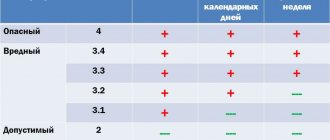Concept of labor protection
What is labor protection at an enterprise and why is it needed is stated in Article 209 of the Labor Code.
Occupational safety in Russia is a system or set of measures aimed at protecting the health of an employee during his work activity. The main occupational safety measures can be divided into five groups:
- legal (documentation);
- socio-economic (compulsory insurance of employees, payment of compensation, provision of benefits, etc.);
- organizational and technical (special assessment of working conditions in the workplace, personnel optimization, etc.);
- sanitary and hygienic (providing workers with special clothing, footwear and other protective equipment).
- preventive (medical examinations of employees, creation of a system of sports rehabilitation for employees).
Thus, labor protection includes a set of measures aimed at creating safe working conditions for employees and the enterprise as a whole.
Labor protection system
The labor protection system is a system for preserving the life and health of workers. The rules and procedures for labor protection of workers are regulated by the Labor Code of the Russian Federation. Previously, the organization of the labor protection system at the enterprise was carried out on the basis of the provisions of Federal Law dated July 17, 1999 No. 181-FZ “On the fundamentals of labor protection in the Russian Federation.” The Labor Protection Law became invalid on October 5, 2006.
Labor protection for workers includes the creation of a workable labor protection management system in the company (Article 217 of the Labor Code of the Russian Federation).
It is necessary for all organizations and entrepreneurs with more than 50 employees to create an occupational safety service or hire a specialist in this field. Moreover, this condition is true not only for manufacturing employers, but also for those operating in the service sector (letter of the Ministry of Labor dated June 10, 2016 No. 5-2/OOG-2136).
The service will monitor working conditions in a company or individual entrepreneur, monitor the safety of work on equipment, investigate industrial accidents, and train employees.
In an organization employing no more than 50 people, the functions of auditing labor protection according to the Labor Code of the Russian Federation can be assigned to any employee - part-time or part-time. For example, an accountant, HR officer, production department manager or head of the sales department. But only if this person agrees to such changes. If you expand the list of responsibilities unilaterally, then the employee will be able to challenge them in court (decision of the Central District Court of Sochi dated July 3, 2014 No. 2-2795/2014).
In addition, the company needs to develop local regulations on labor protection issues. Firstly, the provision on labor protection. Secondly, a training program on labor protection. Thirdly, instructions on labor protection. It is developed based on the position or profession of the employees.
General requirements
Contains certain requirements.
There is a wide range of documents regulating communication between employees and subordinates. The regulatory guidelines that define the rights of both parties in the field of labor protection look like this:
- Industry-specific regulations and state standards;
- Local agreements formed by the team;
- Generally accepted labor protection rules;
- Sanitary standards;
- Chapter 34 in the Labor Code of the Russian Federation.
Each manager bears criminal and administrative responsibility in case of deviation from the established rules for ensuring labor safety. Most often, the company’s activities related to the provision of services to small organizations are carried out without the supervision of management personnel over labor protection.
In most such cases, it is not capable of seriously affecting the functioning of the enterprise.
Legislative acts oblige the management of organizations of any size to carry out registered activities within the framework of established standards and rules.
General requirements:
- ensuring appropriate work and rest conditions for employees;
- periodic testing of residual knowledge and familiarization with labor protection, in addition to briefing upon hiring;
- mandatory conclusion of insurance contracts in the medical fund of all full-time employees of the organization;
- compliance with safety standards for workers during their work and a significant reduction in the likelihood of situations threatening their health;
- issuing appropriate equipment to subordinates at the expense of the enterprise’s budgetary funds;
- removal from work of workers who do not have a medical examination and are not familiar with the adopted safety precautions.
Each company individually develops labor protection installations. They vary according to the characteristics of the activity.
Elements of labor protection
Safety precautions are a system of organizational and technical measures and means that will help prevent employees from being exposed to hazardous production factors;
Fire safety – measures that are aimed at improving the fire safety situation and reducing the risk of fires during work;
Sanitary and hygienic working conditions are a set of measures that are aimed at creating a comfortable microclimate in the workplace and ensuring adequate rest and living conditions on the company’s territory.
Electrical safety is a system of measures that are aimed at protecting against the harmful and dangerous effects of electric current, electric arc, electromagnetic field and static electricity.
Occupational safety management - work to ensure safety, reduce injuries and accidents, occupational diseases, improve working conditions.
Labor protection 2021 – 2021: new rules
The labor protection legislation was amended in 2021. One of the main changes to the labor protection rules 2021 is the introduction of assessment of professional qualifications in the form of a professional exam, which is conducted by specialized centers. Compliance of qualifications with professional standards can be at the initiative of both an individual and an employer.
Another innovation is the new GOST standards on labor protection from 2021. Additional requirements for physical factors in the workplace are established by the new SanPiN 2.2.4.3359-16. The document lists standards for illumination, vibration, electromagnetic fields, microclimate, noise, radiation, ultra- and infrasound. Non-compliance with standards and the presence of harmful factors can be identified in the process of conducting a special assessment of working conditions.
In addition to SanPiN 2.2.4.3359-16, other regulations on labor protection – 2021 have been adopted:
- Organization of occupational safety training - GOST 12.0.004-2015;
- Hazardous and harmful production factors - GOST 12.0.003-2015;
- Signal colors, safety signs and signal markings - GOST 12.4.026-2015;
- Occupational safety management system - GOST 12.0.230.1-2015, GOST 12.0.230.2-2015.
Changes in labor protection in 2021 also affected micro-enterprises. Now they may not have to draw up internal labor regulations, wage regulations, bonus regulations, or shift schedules. All issues that are usually enshrined in local acts can be included in employment contracts. Microenterprises can conclude agreements on the basis of the standard form from the Decree of the Government of the Russian Federation dated August 27, 2016 No. 858.
Another amendment to the labor protection rules in 2021 - the Social Insurance Fund will reimburse costs only for personal protective equipment manufactured in the Russian Federation from Russian fabrics, knitted fabrics, and non-woven materials.
Labor safety news
The main news on labor protection - the Ministry of Labor approved the “Road Map” for the abolition and updating of mandatory requirements in the field of compliance with labor legislation and other regulations containing labor law standards.
In particular, amendments to the procedure are planned for the 2nd quarter of 2021 if, based on the results of a special assessment at the workplace, no harmful or dangerous production factors were identified.
Also in 2021, it is planned to change the procedure for training in labor protection and testing knowledge of labor protection requirements.
To learn everything new in labor safety in a timely manner, read labor safety news on the website of the Ministry of Labor of the Russian Federation.
Control and supervision in the field of labor protection
In the Russian Federation, taking into account the exceptional importance of measures and requirements related to ensuring labor safety requirements, control and supervisory measures are provided for by an authorized government body - the Federal Labor Inspectorate, formed as part of the Ministry of Labor and Social Protection of the Russian Federation.
The competence of the above-mentioned executive authority includes control over the implementation of labor legislation, including all rules and requirements established in the field of labor protection.
Other government bodies also supervise the implementation of sanitary, hygienic and anti-epidemic requirements, the correct design, installation and operation of electrical mechanisms and equipment, compliance with fire safety requirements, etc.
Need advice on your academic work? Ask a question to the teacher and get an answer in 15 minutes! Ask a Question
Occupational safety requirements
Labor protection requirements are requirements that establish rules, procedures and criteria aimed at preserving the life and health of workers in the process of work.
What documents set out labor protection requirements? In addition to the Labor Code, labor protection rules obligatory for the employer are prescribed in the following laws and regulations:
- Federal Law of March 30, 1999 No. 52-FZ “On the sanitary and epidemiological welfare of the population”;
- Resolution of the Ministry of Labor of Russia dated 02/08/2000 No. 14 “On approval of Recommendations for organizing the work of the Labor Safety Service in organizations”;
- Order of the Ministry of Health and Social Development of the Russian Federation dated 01.06.2009 No. 290n “On approval of intersectoral rules for providing workers with special clothing, special footwear and other personal protective equipment”;
- Federal Law of December 28, 2013 No. 426-FZ “On special assessment of working conditions.”
Compliance with security requirements is the responsibility of every employer, regardless of what taxation system it uses. The employer is obliged to provide at his own expense:
- safety during operation of equipment, buildings and materials and tools used in the work process;
- use of protective equipment that has passed the declaration of conformity or certification;
- appropriate conditions at each workplace;
- issuing personal protective equipment and disinfectants to employees who work in dirty conditions, uncomfortable temperature conditions or unsafe conditions;
- conducting a special assessment of working conditions;
- working conditions in the workplace that comply with labor protection requirements, their control, sanitary and medical care for workers;
- work and rest schedule.
The full list of employer responsibilities is listed in Article 212 of the Labor Code.
Lecture on the topic “Legal basis of labor protection”
Lecture 7-8
Topic: “Legal basis of labor protection”
Legal sources of labor protection
Under the right
understand a system of generally binding social norms protected by the power of the state. With the help of law, society, represented by the state, regulates the behavior of people and groups and establishes a certain range of social relations as mandatory for all citizens. This is expressed, as a rule, in the form of certain norms.
Rule of law
is a general rule of conduct established by the state that regulates social relations and is protected by the coercive force of the state. The norms require written consolidation in certain forms - documents, which will then become sources of law for all members of society.
In our country, the main source of law is regulatory legal acts (RLA), among which laws have the greatest force.
The legal basis for labor protection comes from the highest law of our country - the Constitution of the Russian Federation, which says: “3. Everyone has the right to work in conditions that meet safety and hygiene requirements...” (Clause 3, Article 37).
Regulation of labor relations, including in the field of labor protection, in accordance with the Constitution of the Russian Federation and federal constitutional laws is carried out:
labor legislation (including legislation on labor protection), consisting of the Labor Code of the Russian Federation
, other federal laws and laws of constituent entities of the Russian Federation containing labor law standards;
other regulatory legal acts containing labor law norms:
decrees of the President of the Russian Federation;
decrees of the Government of the Russian Federation and regulatory legal acts of federal executive authorities;
NLA of executive authorities of the constituent entities of the Russian Federation;
regulatory legal acts of local government bodies.
Labor relations and other relations directly related to them are also regulated by collective agreements, agreements and local regulations containing labor law norms.
System of regulatory legal acts containing state regulatory requirements for labor protection
The main task of regulatory legal acts on labor protection is to establish rules, procedures, criteria and standards aimed at preserving the life and health of workers in the process of work.
State regulatory requirements for labor protection contain:
- in federal laws;
other regulatory legal acts of the Russian Federation;
in the laws of the constituent entities of the Russian Federation;
other regulatory legal acts of the constituent entities of the Russian Federation,
On December 27, 2010, the Government of the Russian Federation adopted Resolution No. 1160 “On approval of the Regulations on the development, approval and amendment of regulatory legal acts containing state regulatory requirements for labor protection.”
This Resolution establishes a system of by-laws and regulations containing state regulatory requirements for labor protection. This system includes the following types of legal acts:
labor safety standards;
rules and standard instructions on labor protection;
state sanitary and epidemiological rules and regulations (sanitary rules and regulations, sanitary standards, sanitary rules and hygienic standards that establish requirements for factors in the working environment and the labor process) (hereinafter also referred to as acts containing labor protection requirements).
Amendments to acts containing labor protection requirements are carried out by the Ministry of Labor and Social Protection of the Russian Federation:
a) when the legislation of the Russian Federation on labor protection changes;
b) based on the results of comprehensive studies of the state and causes of industrial injuries and occupational diseases;
c) based on the results of studying Russian and international experience in improving working conditions;
d) based on an analysis of the results of certification of workplaces for working conditions, the results of the introduction of new equipment and technologies;
e) on proposals (with justification) of federal executive authorities and (or) executive authorities of constituent entities of the Russian Federation, including on the harmonization of acts containing labor protection requirements with the norms of international law in the field of labor protection.
State regulatory requirements for labor protection are mandatory for legal entities and individuals to carry out any type of activity, including the design, construction (reconstruction) and operation of facilities, the design of machines, mechanisms and other equipment, the development of technological processes, the organization of production and labor
Local regulations, including labor protection requirements
Employers adopt local regulatory acts (LNA) containing labor law norms, within their competence in accordance with labor legislation and other regulatory legal acts containing labor law norms, collective agreements, and agreements.
The main purpose of the LNA is to specify legislative and other regulatory legal acts on labor protection, taking into account the characteristics and working conditions in the organization.
Examples of labor regulations that include labor protection requirements:
regulations (Regulations on the labor protection service, Regulations on the procedure for training and testing knowledge on labor protection of workers, etc.);
labor protection instructions;
lists (List of professions and positions of workers exempt from initial training at the workplace, List of types of high-risk work carried out under a work permit, etc.)
In cases provided for by the Labor Code, other federal laws and other regulatory legal acts of the Russian Federation, collective agreements, agreements, the employer, when adopting the LNA, takes into account the opinion of the representative body of employees (if there is such a representative body).
Not applicable:
LNA norms that worsen the situation of workers in comparison with established labor legislation and other regulatory legal acts containing labor law norms, collective agreements, agreements;
LNA adopted without observing the procedure for taking into account the opinion of the representative body of workers established by Article 372 of the Labor Code.
In such cases, labor legislation and other regulatory legal acts containing labor law norms, collective agreements, and agreements are applied.
The employee’s right to work in conditions that meet labor protection requirements
In accordance with Art. 219 of the Labor Code of the Russian Federation, every employee has the right to:
a workplace that meets labor protection requirements;
compulsory social insurance against industrial accidents and occupational diseases;
obtaining reliable information about labor conditions and safety in the workplace, about the existing risk of damage to health, as well as about measures to protect against exposure to harmful and (or) hazardous production factors;
refusal to perform work in the event of a danger to his life and health due to violation of labor protection requirements, with the exception of cases provided for by federal laws, until such danger is eliminated;
provision of personal and collective protective equipment in accordance with labor protection requirements at the expense of the employer;
training in safe labor methods and techniques at the expense of the employer;
additional professional education at the expense of the employer in the event of liquidation of a workplace due to violation of labor protection requirements;
a request to conduct an inspection of the conditions and labor protection at his workplace, as well as an appeal on labor protection issues to the bodies specified in the Labor Code of the Russian Federation;
personal participation or participation through his representatives in the consideration of issues related to ensuring safe working conditions at his workplace, and in the investigation of an industrial accident or occupational disease that has occurred to him;
an extraordinary medical examination in accordance with medical recommendations with retention of his place of work (position) and average earnings during the said medical examination;
guarantees and compensations established in accordance with this Code, collective agreement, agreement, local regulations, employment contract, if he is employed in work with harmful and (or) dangerous working conditions.
The amount, procedure and conditions for providing guarantees and compensation to employees engaged in work with harmful and (or) dangerous working conditions are established in the manner prescribed by Articles 92, 117 and 147 of the Labor Code of the Russian Federation.
Increased or additional guarantees and compensation for work in jobs with harmful and (or) dangerous working conditions may be established by a collective agreement or local regulations, taking into account the financial and economic situation of the employer.
If safe working conditions are provided at workplaces, confirmed by the results of a special assessment of working conditions or the conclusion of a state examination of working conditions, guarantees and compensation for workers are not established.
Guarantees for the protection of workers’ rights to work in conditions that meet labor protection requirements
The state guarantees workers the protection of their right to work in conditions that meet labor protection requirements (Article 220 of the Labor Code of the Russian Federation).
The working conditions provided for in the employment contract must comply with labor protection requirements.
During the suspension of work in connection with the suspension of activities or a temporary ban on activities due to violation of state regulatory requirements for labor protection through no fault of the employee, his place of work (position) and average earnings are retained. During this time, the employee, with his consent, can be transferred by the employer to another job with wages for the work performed, but not lower than the average earnings for the previous job.
If an employee refuses to perform work in the event of a danger to his life and health (except for cases provided for by the Labor Code of the Russian Federation and other federal laws), the employer is obliged to provide the employee with another job while such danger is eliminated.
If providing another job for objective reasons is impossible for an employee, the employee’s downtime until the danger to his life and health is eliminated is paid by the employer in accordance with the Labor Code of the Russian Federation and other federal laws.
If the employee is not provided with personal and collective protective equipment in accordance with established standards, the employer does not have the right to require the employee to perform work duties and is obliged to pay for downtime arising for this reason in accordance with this Code.
An employee’s refusal to perform work in the event of a danger to his life and health due to violation of labor protection requirements or from performing heavy work and work with harmful and (or) dangerous working conditions not provided for in the employment contract does not entail bringing him to disciplinary liability .
In the event of harm to the life and health of an employee during the performance of his job duties, compensation for said harm is carried out in accordance with federal law.
In order to prevent and eliminate violations of state regulatory requirements for labor protection, the state ensures the organization and implementation of state supervision and control over their compliance and establishes the responsibility of the employer and officials for violation of these requirements.
Responsibility for violation of labor protection requirements
Administrative liability for violation of labor protection requirements
An administrative offense is an unlawful, guilty action (inaction) of an individual or legal entity for which administrative liability is established by the Code of the Russian Federation on Administrative Offenses or the laws of the constituent entities of the Russian Federation on administrative offenses.
A legal entity is found guilty of committing an administrative offense if it is established that it had the opportunity to comply with the rules and regulations for violation of which administrative liability is provided, but this person did not take all measures depending on it to comply with them.
Responsibility for violation of labor and labor protection legislation is provided for in Article 5.27 of the Code of Administrative Offenses of the Russian Federation (CAO), the content of which until December 31, 2014 is as follows:
1. Violation of labor and labor protection legislation shall entail the imposition of an administrative fine:
- for officials in the amount of 1 000
up to
5,000
rubles;
for persons carrying out entrepreneurial activities without forming a legal entity - from 1 000
up to
5,000
rubles or administrative suspension of activities for up to
90
days;
- for legal entities - from 30 000
up to
50,000
rubles or administrative suspension of activities for up to
90
days.
2. Violation of labor and labor protection legislation by an official who was previously subjected to administrative punishment for a similar administrative offense shall entail disqualification
for a period of one to three years.
Disqualification consists of depriving an individual of the right to occupy leadership positions in the executive management body of a legal entity, to join the board of directors (supervisory board), to carry out entrepreneurial activities to manage a legal entity, as well as to manage a legal entity in other cases provided for by the legislation of the Russian Federation.
The procedure for bringing to administrative liability is defined in the Code of the Russian Federation on Administrative Offenses.
Since 2015, changes have been made to Article 5.27, and the Code of Administrative Offenses has been supplemented with Article 5.27.1 with the following content:
“Article 5.27.1. Violation of state regulatory requirements for labor protection contained in federal laws and other regulatory legal acts of the Russian Federation
1. Violation of state regulatory requirements for labor protection contained in federal laws and other regulatory legal acts of the Russian Federation, with the exception of cases provided for in parts 2 - 4 of this article, -
entails a warning or the imposition of an administrative fine on officials in the amount of two thousand to five thousand rubles; for persons carrying out entrepreneurial activities without forming a legal entity - from two thousand to five thousand rubles; for legal entities - from fifty thousand to eighty thousand rubles.
2. Violation by an employer of the established procedure for conducting a special assessment of working conditions at workplaces or failure to conduct it -
entails a warning or the imposition of an administrative fine on officials in the amount of five thousand to ten thousand rubles; for persons carrying out entrepreneurial activities without forming a legal entity - from five thousand to ten thousand rubles; for legal entities from sixty thousand to eighty thousand rubles.
3. Admission of an employee to perform job duties without undergoing training in the established order and testing knowledge of labor protection requirements, as well as mandatory preliminary (upon entry to work) and periodic (during employment) medical examinations, mandatory medical examinations at the beginning of the working day (shifts), mandatory psychiatric examinations or in the presence of medical contraindications -
shall entail the imposition of an administrative fine on officials in the amount of fifteen thousand to twenty-five thousand rubles; for persons carrying out entrepreneurial activities without forming a legal entity - from fifteen thousand to twenty-five thousand rubles; for legal entities - from one hundred ten thousand to one hundred thirty thousand rubles.
4. Failure to provide workers with personal protective equipment -
shall entail the imposition of an administrative fine on officials in the amount of twenty thousand to thirty thousand rubles; for persons carrying out entrepreneurial activities without forming a legal entity - from twenty thousand to thirty thousand rubles; for legal entities - from one hundred thirty thousand to one hundred fifty thousand rubles.
5. Commitment of administrative offenses provided for in parts 1 - 4 of this article by a person previously subjected to administrative punishment for a similar administrative offense -
shall entail the imposition of an administrative fine on officials in the amount of thirty thousand to forty thousand rubles or disqualification for a period of one to three years; for persons carrying out entrepreneurial activities without forming a legal entity - from thirty thousand to forty thousand rubles or administrative suspension of activities for a period of up to ninety days; for legal entities - from one hundred thousand to two hundred thousand rubles or administrative suspension of activities for a period of up to ninety days.
Note. “Personal protective equipment in Part 4 of this article should be understood as personal protective equipment classified by the technical regulations of the Customs Union “On the safety of personal protective equipment” to class 2, depending on the degree of risk of harm to the employee.”
Criminal liability for violation of labor protection requirements
The basis of criminal liability is the commission of an act containing all the elements of a crime provided for by the Criminal Code of the Russian Federation (CC RF).
At the same time, the grounds for bringing to criminal liability and punishment for violation of labor protection requirements are provided for in Article 143 of the Criminal Code of the Russian Federation, the content of which is as follows:
1. Violation of labor protection requirements, committed by a person who is entrusted with the obligation to comply with them, if this entailed, through negligence, the infliction of serious harm to human health, -
shall be punishable by a fine in the amount of up to four hundred thousand rubles, or in the amount of the wages or other income of the convicted person for a period of up to eighteen months, or by compulsory labor for a term of one hundred eighty to two hundred and forty hours, or by corrective labor for a term of up to two years, or by forced labor for a term of up to one year, or imprisonment for the same period with deprivation of the right to hold certain positions or engage in certain activities for a period of up to one year or without it.
2. An act provided for by the first part of Article 143 of the Criminal Code of the Russian Federation, resulting in the death of a person through negligence, -
shall be punishable by forced labor for a term of up to four years or imprisonment for the same term with or without deprivation of the right to hold certain positions or engage in certain activities for a term of up to three years.
3. An act provided for in the first part of this article, resulting in the death of two or more persons through negligence, -
shall be punishable by forced labor for a term of up to five years or imprisonment for the same term with or without deprivation of the right to hold certain positions or engage in certain activities for a term of up to three years.
Note. In this article, labor protection requirements are understood as state regulatory labor protection requirements contained in federal laws and other regulatory legal acts of the Russian Federation, laws and other regulatory legal acts of the constituent entities of the Russian Federation.
Organization of labor protection at the enterprise
Responsibilities and powers in the field of labor protection. Social partnership between employer and employees in the field of labor protection
Responsibilities of the employer to comply with labor protection requirements
Responsibilities for ensuring safe conditions and labor protection are assigned to the employer on the basis of Article 212 of the Labor Code of the Russian Federation.
The employer is obliged to provide:
worker safety
during the operation of buildings, structures, equipment, implementation of technological processes, as well as tools, raw materials and supplies used in production;
creation and operation
occupational safety management systems;
application
have passed mandatory certification or declaration of conformity of
personal and collective protective equipment
for workers;
relevant
labor protection requirements,
working conditions
at each workplace;
work and rest schedule
employees in accordance with labor legislation and other regulatory legal acts containing labor law standards;
acquisition and issuance
at the expense of own
means of special clothing, special shoes and other personal protective equipment
(PPE)
, flushing and neutralizing agents
, in accordance with established standards;
education
safe methods and techniques for performing work and providing first aid to victims at work, conducting labor safety training, on-the-job training and testing knowledge of labor safety requirements;
prohibition from work of persons who have not undergone training in accordance with the established procedure
and instruction on labor protection, internship and testing of knowledge of labor protection requirements;
organizing monitoring of working conditions
in the workplace, as well as the correct use of personal and collective protective equipment by workers;
conducting a special assessment of working conditions
;
in cases provided for by regulatory legal acts, organize
at their own expense, mandatory (preliminary, periodic) and extraordinary
medical examinations
, mandatory
psychiatric examinations
of employees with retention of their place of work (position) and average earnings for the duration of the said medical examinations (examinations), mandatory psychiatric examinations;
preventing employees from performing their job duties without undergoing mandatory medical examinations (examinations), mandatory psychiatric examinations, as well as in the case of medical contraindications;
informing
workers about labor conditions and safety
in the workplace,
about the risk of damage to health
and
the compensation
and
personal protective equipment
;
provision
as established in Art.
212 bodies of information and documents
necessary for them to exercise their powers;
taking measures to prevent emergency situations
,
preserving the life and health of workers
in the event of such situations, including
providing first aid to victims
;
investigation and accounting
in accordance with the established procedure,
industrial accidents and occupational diseases
;
sanitary, medical and preventive services
workers in accordance with labor protection requirements, as well as
delivery of workers
who
become ill at work to a medical organization
in the event of the need to provide them with emergency medical care;
unhindered access
established in Art. 212 persons for the purpose of conducting inspections of labor conditions and labor protection and investigating industrial accidents and occupational diseases;
compliance with instructions
authorized officials and
consideration of submissions
from public control bodies within the established time frame;
compulsory social insurance for employees
from accidents at work and occupational diseases;
familiarization of workers with labor protection requirements
;
development and approval of rules and instructions on labor protection
for employees in accordance with the established procedure;
availability of a set of regulatory legal acts
containing labor protection requirements in accordance with the specifics of their activities.
Responsibilities of employees to comply with labor protection requirements
The responsibilities of an employee in the field of labor protection are defined in Article 214 of the Labor Code of the Russian Federation.
The employee is obliged:
comply with labor protection requirements;
- correctly use personal and collective protective equipment;
undergo training in safe methods and techniques for performing work and providing first aid to victims at work, instruction on labor protection, on-the-job training, testing of knowledge of labor protection requirements;
immediately notify your immediate or superior manager about any situation that threatens the life and health of people, about every accident that occurs at work, or about a deterioration in your health, including the manifestation of signs of an acute occupational disease (poisoning);
undergo mandatory preliminary and periodic medical examinations (examinations), as well as undergo extraordinary medical examinations (examinations) at the direction of the employer in cases provided for by the Labor Code of the Russian Federation and other federal laws.
Labor protection service (specialist) of the organization
In order to ensure compliance with labor protection requirements and monitor their implementation, each employer engaged in production activities, whose number of employees exceeds 50 people, creates a labor protection service or introduces the position of a labor protection specialist with appropriate training or experience in this field ( Article 217 of the Labor Code of the Russian Federation).
An employer whose number of employees does not exceed 50 people decides to create a labor protection service or introduce the position of a labor protection specialist, taking into account the specifics of its production activities.
If the employer does not have an occupational safety service or a full-time occupational safety specialist, their functions are performed by the employer - an individual entrepreneur (personally), the head of an organization, another employee authorized by the employer, or an organization or specialist providing services in the field of occupational safety and health, engaged by the employer under a civil contract .
On February 8, 2000, Resolution of the Ministry of Labor of the Russian Federation No. 14 approved recommendations for organizing the work of the security service, which define the main tasks, functions, procedure for organizing the work of the labor protection service, as well as the rights of its employees.
The structure of the occupational safety service in the organization and the number of workers in the occupational safety service are determined by the employer. In this case, it is recommended to be guided by the Interindustry standards for the number of occupational safety and health workers in organizations, put into effect by Resolution of the Ministry of Labor of the Russian Federation No. 10 of January 22, 2001.
Job responsibilities and qualification requirements for the head of the occupational safety service and occupational safety specialist are given in the Qualification Directory of Positions of Managers, Specialists and Other Employees, section “Qualification Characteristics of the Positions of Specialists Carrying Out Work in the Field of Occupational Safety” approved by Order of the Ministry of Health and Social Development of Russia dated May 17, 2012 N 559n.
Committees (commissions) on labor protection
In accordance with Article 218 of the Labor Code of the Russian Federation, at the initiative of the employer and (or) at the initiative of employees or their representative body, labor protection committees (commissions) are created. Their composition on a parity basis (each party has one vote, regardless of the total number of representatives of the party) includes representatives of the employer and representatives of the elected body of the primary trade union organization or other representative body of workers.
Order of the Ministry of Labor of the Russian Federation dated June 24, 2014 No. 412n approved the Standard Regulations on the Occupational Safety and Health Committee (Commission), which defines the tasks, functions, rights of the committee (commission), organization and procedure for its (her) work.
Based on the Model Regulations, a Regulation on the organization’s labor protection committee (commission) is developed, which is approved by order (instruction) of the employer, taking into account the opinion of the elected trade union body and (or) other representative body authorized by the organization’s employees.
The composition of the committee is approved by order (instruction) of the employer.
The committee elects a chairman, deputies from each party and a secretary from among its members. The chairman of the committee, as a rule, is the employer or his responsible representative, one of the deputies is a representative of the elected trade union body and (or) another representative body authorized by the employees, and the secretary is an employee of the labor protection service.
The labor protection committee (commission) organizes:
joint actions of the employer and employees to ensure labor safety requirements, prevent industrial injuries and occupational diseases;
carrying out inspections of labor conditions and labor protection at workplaces and informing workers about the results of these inspections;
collection of proposals for the section of the collective agreement (agreement) on labor protection.
The Committee carries out its activities in accordance with the regulations and work plan it develops.
Authorized (trusted) persons for labor protection
The organization of the institution of authorized (trusted) persons for labor protection is carried out in accordance with the “Recommendations for organizing the work of an authorized (trusted) person for labor protection of a trade union or work collective,” approved by Resolution of the Ministry of Labor of Russia dated April 8, 1994 No. 30.
The purpose of creating the Institute of Commissioners is to organize public control over compliance with the legal rights and interests of workers in the field of labor protection. At the same time, the commissioners also monitor the performance of employees in this area.
The main tasks of the commissioners are:
assistance in creating healthy and safe working conditions at the enterprise (in the division) that meet the requirements of labor protection standards and regulations;
monitoring the state of labor protection at the enterprise (in the division) and the observance of the rights and interests of workers in the field of labor protection.
representing the interests of workers in state and public organizations when considering labor disputes related to labor protection issues;
consulting workers on labor protection issues, providing them with assistance in protecting their rights to labor protection.
Depending on the specific production conditions, several authorized representatives may be elected in a structural unit. The number, procedure for their election and term of office may be stipulated in a collective agreement or other other joint decision of the employer and the representative body of employees.
Trade union(s), other representative bodies or labor collectives authorized by employees organize elections of authorized representatives in structural divisions or in the enterprise as a whole. Authorized persons may also be elected from among specialists who do not work at the given enterprise (by agreement with the employer). It is not recommended to elect authorized workers who, by virtue of their position, are responsible for the state of labor protection at the enterprise.
Authorized persons are, as a rule, members of the enterprise's labor protection committee (commission).
Occupational safety and health in the workplace
The employer is obliged to ensure that workplaces comply with labor protection requirements. The location and organization of workplaces, equipment and tools for work, the air environment and other conditions must be safe and not threaten the life of the worker.
To determine how the employer complies with labor protection requirements for the workplace, a special assessment of working conditions at each workplace is carried out.
A special assessment of working conditions is a set of measures with the help of which harmful and dangerous production factors are identified and their impact on the worker’s body is assessed.
All jobs are subject to special assessment, except for homeworkers and remote workers. A special assessment of working conditions should be carried out at least once every five years. This period is counted from the day when the results of the special assessment were approved. Read more in the article “Special assessment of working conditions”.
Labor safety rules and regulations
The employer needs to fix the rules and regulations of labor protection at the enterprise. To do this, first of all, you should:
- systematize shortcomings in the field of worker safety identified during inspections;
- establish irrelevant labor safety standards;
- evaluate the effectiveness of existing rules.
Then it is necessary to draw up and approve a regulation on labor protection. That is, a document that specifies the basic rules of labor protection at the enterprise. To prevent the labor protection provision from becoming cumbersome, do not include in it general labor protection rules that are expressly provided for by law. For example, the provision of free protective clothing and milk to workers in hazardous industries.
It is also possible to include in a separate safety regulation the rules for conducting labor safety briefings and testing the knowledge acquired by employees, and make separate safety instructions for each department.
It is also possible to include in a separate safety regulation the rules for conducting labor safety briefings and testing the knowledge acquired by employees, and make separate safety instructions for each department.
Regulatory documents on labor protection of a recommendatory nature
The most useful information for an occupational safety specialist is contained in the regulatory legal acts on labor protection that form the safety standards system. Some of the state standards, rules and norms of labor protection included in its composition are advisory in nature, i.e. organizations are given the right to independently decide whether to use a specific GOST or not. For example, GOST 12.0.004-2015 will help to efficiently organize labor protection training for workers, in addition to the mandatory Resolution 1/29. In the SSBT, numerous rules and regulations on labor protection are systematized and divided into subsystems (currently there are 6 of them - from 0 to 5 inclusive), so choosing the necessary regulatory documents on labor protection from here will not be difficult.
The Model Instructions, which are usually approved at the federal level, are also advisory in nature. During the development of your own instructions, the text of standard instructions can be changed and supplemented, or you can not use them at all and work “from scratch”, observing the requirements of RD 11 12.0035-94.








